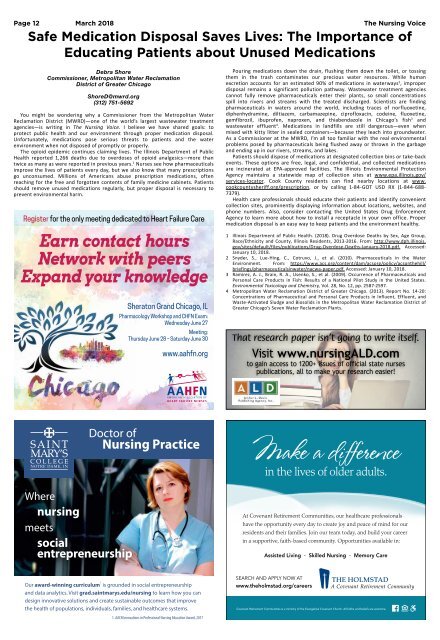The Nursing Voice - March 2018
- No tags were found...
Create successful ePaper yourself
Turn your PDF publications into a flip-book with our unique Google optimized e-Paper software.
Page 12 <strong>March</strong> <strong>2018</strong> <strong>The</strong> <strong>Nursing</strong> <strong>Voice</strong><br />
Safe Medication Disposal Saves Lives: <strong>The</strong> Importance of<br />
Educating Patients about Unused Medications<br />
Debra Shore<br />
Commissioner, Metropolitan Water Reclamation<br />
District of Greater Chicago<br />
ShoreD@mwrd.org<br />
(312) 751-5692<br />
You might be wondering why a Commissioner from the Metropolitan Water<br />
Reclamation District (MWRD)—one of the world’s largest wastewater treatment<br />
agencies—is writing in <strong>The</strong> <strong>Nursing</strong> <strong>Voice</strong>. I believe we have shared goals: to<br />
protect public health and our environment through proper medication disposal.<br />
Unfortunately, medications pose serious threats to patients and the water<br />
environment when not disposed of promptly or properly.<br />
<strong>The</strong> opioid epidemic continues claiming lives. <strong>The</strong> Illinois Department of Public<br />
Health reported 1,266 deaths due to overdoses of opioid analgesics—more than<br />
twice as many as were reported in previous years. 1 Nurses see how pharmaceuticals<br />
improve the lives of patients every day, but we also know that many prescriptions<br />
go unconsumed. Millions of Americans abuse prescription medications, often<br />
reaching for the free and forgotten contents of family medicine cabinets. Patients<br />
should remove unused medications regularly, but proper disposal is necessary to<br />
prevent environmental harm.<br />
Register for the only meeting dedicated to Heart Failure Care<br />
Earn contact hours<br />
Network with peers<br />
Expand your knowledge<br />
Sheraton Grand Chicago, IL<br />
Pharmacology Workshop and CHFN Exam:<br />
Wednesday June 27<br />
Meeting:<br />
Thursday June 28 – Saturday June 30<br />
www.aahfn.org<br />
Pouring medications down the drain, flushing them down the toilet, or tossing<br />
them in the trash contaminates our precious water resources. While human<br />
excretion accounts for an estimated 90% of medications in waterways 2 , improper<br />
disposal remains a significant pollution pathway. Wastewater treatment agencies<br />
cannot fully remove pharmaceuticals enter their plants, so small concentrations<br />
spill into rivers and streams with the treated discharged. Scientists are finding<br />
pharmaceuticals in waters around the world, including traces of norfluoxetine,<br />
diphenhydramine, diltiazem, carbamazepine, ciprofloxacin, codeine, fluoxetine,<br />
gemfibrozil, ibuprofen, naproxen, and thiabendazole in Chicago’s fish 3 and<br />
wastewater effluent 4 . Medications in landfills are still dangerous—even when<br />
mixed with kitty litter in sealed containers—because they leach into groundwater.<br />
As a Commissioner at the MWRD, I’m all too familiar with the real environmental<br />
problems posed by pharmaceuticals being flushed away or thrown in the garbage<br />
and ending up in our rivers, streams, and lakes.<br />
Patients should dispose of medications at designated collection bins or take-back<br />
events. <strong>The</strong>se options are free, legal, and confidential, and collected medications<br />
are incinerated at EPA-approved facilities. <strong>The</strong> Illinois Environmental Protection<br />
Agency maintains a statewide map of collection sites at www.epa.illinois.gov/<br />
services-locator. Cook County residents can find nearby locations at www.<br />
cookcountysheriff.org/prescription, or by calling 1-84-GOT USD RX (1-844-688-<br />
7379).<br />
Health care professionals should educate their patients and identify convenient<br />
collection sites, prominently displaying information about locations, websites, and<br />
phone numbers. Also, consider contacting the United States Drug Enforcement<br />
Agency to learn more about how to install a receptacle in your own office. Proper<br />
medication disposal is an easy way to keep patients and the environment healthy.<br />
1 Illinois Department of Public Health. (<strong>2018</strong>). Drug Overdose Deaths by Sex, Age Group,<br />
Race/Ethnicity and County, Illinois Residents, 2013-2016. From: http://www.dph.illinois.<br />
gov/sites/default/files/publications/Drug-Overdose-Deaths-January-<strong>2018</strong>.pdf. Accessed:<br />
January 10, <strong>2018</strong>.<br />
2 Snyder, S., Lue-Hing, C., Cotruvo, J., et al. (2010). Pharmaceuticals in the Water<br />
Environment. From: https://www.acs.org/content/dam/acsorg/policy/acsonthehill/<br />
briefings/pharmaceuticalsinwater/nacwa-paper.pdf. Accessed: January 10, <strong>2018</strong>.<br />
3 Ramirez, A. J., Brain, R. A., Usenko, S., et al. (2009). Occurrence of Pharmaceuticals and<br />
Personal Care Products in Fish: Results of a National Pilot Study in the United States.<br />
Environmental Toxicology and Chemistry, Vol. 28, No. 12, pp. 2587-2597.<br />
4 Metropolitan Water Reclamation District of Greater Chicago. (2013). Report No. 14-20:<br />
Concentrations of Pharmaceutical and Personal Care Products in Influent, Effluent, and<br />
Waste-Activated Sludge and Biosolids in the Metropolitan Water Reclamation District of<br />
Greater Chicago’s Seven Water Reclamation Plants.<br />
That research paper isn’t going to write itself.<br />
Visit www.nursingALD.com<br />
to gain access to 1200+ issues of official state nurses<br />
publications, all to make your research easier!

















